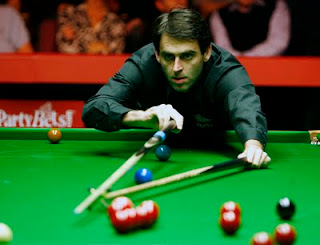Ronald Antonio "Ronnie" O'Sullivan (born 5 December 1975 in Wordsley, West Midlands),is an English professional snooker player known for his rapid playing style and nicknamed "The Rocket".He has been World Champion on three occasions (2001, 2004 and2008), and is second on the all-time prize-money list, with career earnings of over £6 million,behind only Stephen Hendry. O'Sullivan has been the world's no. 1 player on five occasions, has won a total of 22 ranking titles, and is second, again behind Hendry, on the list of competitive century breaks. O'Sullivan has compiled 10 maximum breaks in professional competition, a record which he shares with Hendry.
O'Sullivan is considered by many fans, critics and fellow professionals, including Hendry andSteve Davis, as the most naturally talented player in the history of the game.He has also been involved in a number of controversial incidents during his career.
O'Sullivan grew up, and still lives, in the exclusive Manor Road area in Chigwell, Essex. He attended Wanstead High School.He began his snooker career at an early age, first achieving a century break at the age of 10 (making 117). He scored a maximum break at 15, and turned professional at 16. He won his first 38 ranking matches as a professional – a record that still stands on his way to the 1993 World Championship, where he is the second youngest-ever player to qualify. He lost in the first round 7–10 to Alan McManus, and in the following season he was ranked 57. He became the youngest-ever winner of a ranking tournament when, aged 17, he won the 1993 UK Championship,beating Stephen Hendry in the final, and starting one of the most prominent rivalries in the sport. In 1995, he won his first Masters title.
In the 1996 World Championship, snooker's governing body found him guilty of assaulting Mike Ganley, then a media official, now the tournament director.He was given a two-year suspended sentence and a £20,000 fine, and advised to donate £10,000 to charity.
On 21 April 1997, in the first round of the World Championship against Mick Price, he made the fastest-recorded maximum break, completed in 5 minutes and 20 seconds – an average of one shot every 8.8 seconds.] In November, he won his second UK title, beating Hendry 10–6 in the final.
After winning the 1998 Irish Masters 9–3 against Ken Doherty, he was stripped of his title and disqualified after a drug test found cannabis in his system. The title then went to Doherty.O'Sullivan made it to the semi–finals of the 1999 World Championship, but lost 13–17 to Stephen Hendry. The last four frames of the third session featured four successive centuries: two from Hendry and two from O'Sullivan. Following his solid performance during the previous year, O'Sullivan's promising campaign in the 1999/2000 season (during which he won three ranking titles) ended in disappointment. He was a favourite for the 2000 world title, especially after an unexpected loss by Hendry toStuart Bingham in the first round, but O'Sullivan was also eliminated in the first round by David Gray, who struggled back from 1–5 and 7–9 down to edge out O'Sullivan 10–9 for a place in the second round. In that match, O'Sullivan made five centuries, three in consecutive frames.
In 2001, O'Sullivan claimed his first World Championship title (which he dedicated to his father), with an 18–14 victory over Higgins, and his third UK title, with a 10–1 victory over Doherty. He began the 2002/2003 season ranked number 1.



No comments:
Post a Comment